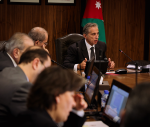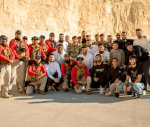You are here
A new Palestinian strategy is desperately needed
May 09,2022 - Last updated at May 09,2022
A terrible and tragic drama is playing out across Israel/Palestine, a dance of death with Israelis and Palestinians each engaged in their own form of destructive violence.
If we should have learned anything from this conflict, it is that just as Palestinian violence has not ended the Israeli occupation or its repression, nor has more Israeli repression or violence ended the Palestinians’ resistance to the occupation. If anything, the violence has produced the opposite. The occupation has intensified and Israeli politics have become so hardline that a governing coalition inclined to act with justice toward Palestinians is impossible to imagine. The brutality and acquisitiveness of the occupation has hardened Palestinian attitudes, strengthened extremist currents, and driven violent acts of desperation.
But it continues, with no lessons learned and the behaviors of both sides playing into the fears of the other, setting the stage for yet another round of anger, revenge, and violence.
During the second Intifada, I warned that because violence was a dead end (literally), a new strategy was needed, to define a goal and then develop tactics to achieve it. I understood that Palestinian anger was real and justified. But revenge is not a strategy. It might make some feel momentary satisfaction, but history has demonstrated that because the occupier has a monopoly on force, it responds disproportionately, taking hundreds of lives for each one lost. Violence begets more violence. When your tactics don’t advance your goal, they don’t constitute a strategy.
Back then, I also noted that Palestinian leadership also had no recognisable strategy. Calls for a new UN resolution would never provide a solution because the US, for reasons of domestic politics, would block it. Relying on the EU was also pointless because it was weak, indecisive and incapable of acting independently. The Russians, Chinese and the “non-aligned” might pass resolutions denouncing the occupation, but with no interest in a direct confrontation with the US, their resolutions weren’t worth the paper they were printed on. And appeals to international law or “legitimacy” were hollow with no enforcement mechanism in place.
Revenge is not a strategy, but neither is complaining about injustice or passing toothless resolutions. Israel will not change by itself, nor will the US or the UN. Therefore, Palestinians must identify what they can change and lay out a path to produce that change. That’s the definition of a strategy.
Martin Luther King once observed that when confronting a more powerful foe, one must never play into their strength; instead, turn their power into a weakness. What I proposed then and propose again is a mass non-violent resistance campaign. Imagine the power of a peaceful march of tens of thousands of unarmed, non-rock throwing Palestinians converging on Jerusalem saying, “Let my people pray.” Or marching from the refugee camps saying, “Let my people go home.”
Palestinians have tried such an approach in the past, for example, at Al Aqsa in July 2017. And instances of nonviolent resistance are in evidence across Palestine on a weekly basis. What is needed is to grow and sustain such an effort, defining anew Palestinian resistance. It will require Palestinian leadership acting to project this new strategy and imposing the necessary discipline to control any counter-productive violence.
Consider how it would play out. The Israelis will attempt to provoke violence. They may shoot demonstrators and make more arrests. But if the non-violence continues, it will put them in a bind that neither military might, nor hasbara campaigns will be able to conquer. They won’t be able to claim victimhood, nor to defeat an empowered Palestinian constituency. Such a campaign will have a transformative impact on Israeli and US politics. That’s the strength of non-violence. It turns the tables, making the powerful weak and the oppressed stronger.
It will no doubt be difficult. But it should be tried because what has been done to date is not working and a new approach is desperately needed.
The writer is president of the Arab American Institute













